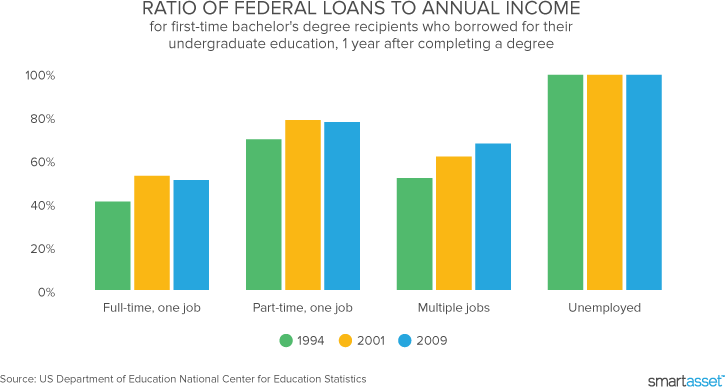
You may have heard of something called “credential creep.” What does it mean? Well, back in the day someone with only a high school diploma could usually find steady employment, maybe even complete with a pension. Higher education wasn't for everyone and some people chose work over college. Later, the bachelor’s degree became the new high school diploma. Jobs like executive assistant positions that used to require only a high school diploma or GED began requiring a BA. Now, in many fields getting some form of graduate training is necessary to boost wages and earn promotions. That increase in the amount of education needed to land a good job? That’s credential creep.
Not all education is created equal, though. How much you stand to gain from going back to school depends on the school you attend, what you study, how much you pay and how old you are. Younger workers have more time to realize the gains from going back to school, while older folks with mortgages and kids’ education to fund may not have as much to gain from hitting the books. So, is college worth the money for you? Should you go to college?
We’ve put together three examples of times when going back to school would be a smart move, and three examples of times when it might not be so smart. Sometimes college is worth it and sometimes college is not worth it.
Consider going back to school if...
- Your employer will pay for it
If you’re lucky enough to work for a company that offers tuition reimbursement, you’d be well served to take advantage of the opportunity to boost your credentials. Talk with your employer about the terms of their tuition assistance, and figure out a course schedule that will let you perform well as both a student and an employee. Harnessing the power of employer dollars and saving yourself student debt in the process? That’s a win-win.
- You were very close to finishing a Bachelor’s degree when you left school
Millions of Americans currently find themselves with a collection of college credits but no degree because circumstances forced them to leave school early. They suffer from the debt and the lost years of work experience that go with a college education, but without the diploma they need to move up the career ladder.
Going back to finish a Bachelor’s degree as a non-traditional student can be daunting, but it’s often a key step to upping your earning power. Plus, the more credits you already have under your belt, the less time and money you’ll need to invest before you get your degree, so the answer to is college worth it for you? Probably yes.
If you were only a few credits shy of a BA when you left school, contact the college you attended and ask them what you can do to complete the credit requirements. Do they offer online or distance courses? Could you get your credits at another college and apply them toward your degree at the first school? In general, it’s easier to take this approach than to try to convince a new institution to take you on as a student for a semester or two while applying all of your credits from your first college. You’re likely better off sticking with the college where you started, if possible. If you're wondering, Should I go to college or get a job? remember that many schools allow students to take evening classes and work on the side.
- You won’t be happy without that extra knowledge
Here at SmartAsset we’re all about return on investment. That being said, there are plenty of people who believe that education is never wasted, and who won’t be happy until they’ve reached their dream level of educational qualification. These people don't ask, Why go to college? They ask, Why leave college?
Do you look at grad school as primarily a life experience and not a pathway to better jobs? If you want, say, a PhD in the humanities no matter what, and you’ll be miserable without it, more power to you. Just be aware that you might make significantly less money over the course of your career, despite having higher credentials.
Skip going to school if...
- You don’t have the right support system
Continuing your education is a major time commitment, especially if you’re planning to work part- or full-time while you take classes. Got a partner? Kids? You’ll need to speak with your family and work together on strategies to minimize the disruption from your transition back to the classroom.
What you don’t want to do is take on loans, only to drop out of school later on because your childcare arrangements aren’t working out or your course load doesn’t allow you to have a family and social life. Is college debt worth it?
There are several steps you can take to find out if going back to school will be a good fit for your schedule and lifestyle:
- Talk with alumni from different schools you’re considering to find out how they juggled their commitments while in school.
- Practice blocking out several hours each week from other responsibilities before you enroll in school, to see you if you can really make the time to attend classes and complete your coursework.
- Enlist the help of friends and relatives so you can offload family responsibilities and take on academic ones.
- You’re past the age when you would realize the monetary benefits of more education
In order for an investment in going back to school to pay off, you have to have the time to realize those returns. The older you get, the faster you need to see gains from your credential boost before your retirement age. You also have fewer working years ahead of you to pay off loans and climb the corporate ladder.
While paying for a new degree might not make sense in your sixties and beyond, if you’re a senior you have more educational opportunities than you might realize. Many universities allow retirees to audit or join their courses, often at no charge. Others have special classes just for the over-65 set.
- You’re considering grad school because you’re out of ideas
We know the job market is tough, but an expensive degree should never be your strategy for avoiding breaking into the workforce. It can be tempting to stay in school because it’s a familiar environment, and one that sometimes comes with perks like health insurance and subsidized housing. Embarking on years of schooling without a sense of focus and direction, though, is not a smart bet.
You’ll get more out of going back to school if you do it with your eyes wide open. Ask yourself where you’re likely to be at the end of your degree. Will you owe money? How will you compete with people who were gaining work experience while you were in school? What if employers tell you you’re over-qualified for the jobs you want? Avoid sliding into a decision as big as going to school, especially if you would need to take on debt to make it happen.

Watch out for…the for-profit college trap
If you decide to go back to school, you’ll have a choice between attending a non-profit institution and a for-profit one. Heavy advertising by for-profit institutions tempts many non-traditional students to forgo the public or non-profit option and instead seek degrees and certificates from for-profit colleges. For-profit colleges have replaced community colleges as the go-to for many non-traditional students. This comes with its own set of risks, though.
For starters, for-profit colleges are much more expensive than public ones, and especially than community colleges. These for-profit institutions make the bulk of their money when students take out federal student loans to finance their course of study. For-profit colleges get paid these federal loan dollars whether or not their students get jobs and repay the debt. Unfortunately, many students leave for-profit institutions on the hook for loan payments they can’t afford. And remember, student loan debt generally cannot be discharged through bankruptcy—it follows you until you pay it off.
The second reason to think carefully before enrolling at a for-profit college is that these institutions have higher dropout and loan default rates than their public counterparts. Students who graduate from for-profit institutions are often unable to find gainful employment when they graduate, a situation that can leave them with dangerously high debt-to-income ratios. Defaulting on one kind of loan affects your future ability to get credit—in other words, it’s a big no-no.
Stats to look out for

Doing some research before you settle on a course of study can save you tens of thousands in loans. Before you write your first applications, hunt down these statistics and see how the programs you’re considering measure up:
- Graduation rate: What percentage of students at the school finish their course of study and graduate with their desired qualification? How do the graduation rates compare between online and in-person courses? A low graduation rate is a red flag.
- Loan default rate: What percentage of the students who borrow money to attend the school end up defaulting on their loans? A high number = not good.
- Job placement rate: Are graduates finding jobs when they leave school? Many programs are reluctant to release this information, which should make you suspicious. A school’s job placement rate is a piece of information you really need if you want to make a smart decision about your education. If you’re looking at PhD programs, try to track down the percentage of finishers who end up in tenure-track jobs, not just any old job. (This is also called a placement record.)
- Accreditation: National accreditation is worth less than regional accreditation, and some colleges aren’t even accredited at all. Make sure the school you choose has respectable accreditation, otherwise you may be hard-pressed to leverage your degree into a good job, or to transfer your credits if you want to switch to a better school.
Consider the MOOC
If you've asked yourself the question, Is college worth it? and decided the answer is no, this doesn’t mean further education is off the table for you. If you’re missing the mental stimulation of the classroom, or simply want to pursue an interest in a particular subject, consider exploring MOOCs. What’s a MOOC? It stands for Massive Open Online Course, and it’s a way to boost your knowledge base without the commitment of forgoing work hours or taking out loans. Taking a MOOC can be a way to ease back into student life and see if you enjoy it before you commit to enrolling with a local or online institution.
